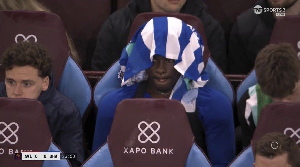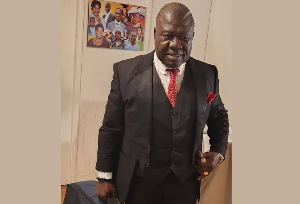Dr. Chris Fomunyoh, of the National Democratic Institute fame, has urged lawyers in Cameroon to battle for change in Cameroon.
Dr. Fomunyoh, an internationally acclaimed personality and advocate for democracy who has observed elections around the world, was speaking at a dinner offered him and his friends, by the President of Fako Lawyers Association, FAKLA, Barrister Felix Agbor Nkongho aka Agbor Balla, at his residence at Federal Quarters, Buea.
Reacting to an insinuation by a Gender and Human Rights activist, Elizabeth Enaka, that lawyers in Cameroon don’t take part in national issues detrimental to citizens, plus interventions from other speakers citing the recently passed law on terrorism and the change of the Constitution of Cameroon some seven years ago, Fomunyoh appealed to the Cameroon Bar Association to take the responsibility of leading the action for change in Cameroon.
Addressing about 100 guests, made up predominantly of lawyers, the press, civil society leaders, civil servants and businessmen, Fomunyoh stated: “The moment is coming for our generation to shape the future of this country. Don’t fear to quote me on anything I say here. The Central Africa sub-region is lagging behind in terms of democracy and change. Meanwhile, of the 15 countries that make up the West Africa sub-region, 13 have known democratic change and their democracy is on a good footing.”
He said he abhors the claim that there is African democracy which dictators hinge on to stick to power.
“Democracy is democracy!” Fomunyoh asserted.
In an intervention, erstwhile President of the Cameroon Bar Council and politician, Barrister Ben Muna, said the discussion should rather be on freedoms, not democracy.
“Democracy is about freedoms and the man or woman in the grassroots will better understand freedoms. If you call out 10 people here, they will define democracy in 10 different ways. But if you tell people that in those days, they could get up and travel to Bamenda, but now they can’t because of identity cards; if you tell people that in those days, they could beat the gong [or drum] and people will assemble in the village square, but today you need a fiat from the prefet or sous-prefet before they hold a meeting; they would better understand.
He said for lawyers to take the lead and fight for change, they need the support of the people and civil society. He said he tried in his own time and failed, but the MC of the day told him that he (Ben Muna) did not fail because he remains an inspiration.
Asked if he would run for the next Presidential election and if he thinks he has what it takes to challenge the present regime, Fomunyoh narrated a long but touching history of his humble beginning when his parents could not even pay his school fees, through going to high school and then going to Harvard Law School, to his present status, where he has created a foundation, the Fomunyoh Foundation, to bring succour to the underprivileged, especially in rural areas.
The narrative drew beads of tears in the eyes of many of the guests and participants at the evening discussion.
Then, as if to whip up their spirits, Fomunyoh declared: “I am prepared to serve my country in any capacity I am requested to.”
Interventions came from civil society leaders like Nwalimu George Ngwane of Africaphonie; Dr.Neba Fontem of the Higher Education Teachers Association (SYNES), Theodore Leke of Southern Cameroons Liberation Struggle, among others.
Reacting to their interventions, particularly the question whether he thinks an Anglophone or someone of erstwhile Southern Cameroons extraction can become the President of Cameroon, Fomunyoh said: “I am aware that, unfortunately, some people are trying to run this country as if we don’t have a history.”
He revisited a constitutional arrangement agreed upon at reunification in 1961.
“At reunification, it was agreed that if the Number One Slot [of the country] went to one of the linguistic groups, the Number Two Slot must go to the other cultural group, to make sure that everyone identifies with the institutions of the State, ... but it is in the minds of people that in the 1992 election, the candidate that was placed in the second position was purposely put there so that power should not go to him because he is from this cultural background,” Fomunyoh lamented adding that, “... at the helm [of the State of Cameroon] we have people who do not believe in democracy.”
He, however, stated: “Despite the darkness of the hour, the time will come when the sun will rise.”
At the end of the discussions, the host, Barrister Agbor Nkongho, who is also Vice President in charge of Central Africa for the African Bar Association, observed that Dr. Fomunyoh did not come out clearly, but they got the message.
“If we don’t have that rotational Presidency, between Southern Cameroons and La Republique du Cameroun, it will never work,” Agbor Balla stated.
Thanking Agbor Balla for the evening, Dr. Fomunyoh said people should emulate his (Agbor Balla’s) initiative.
“How I wish all 22 million people in this country were having this kind of meeting even every evening. I will support town hall meetings of this sort.”
Politique of Sunday, 19 June 2016
Source: The Post Newspaper













